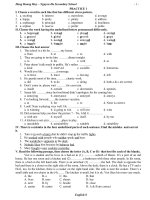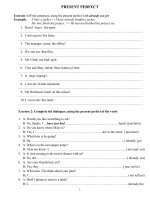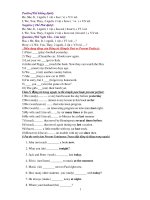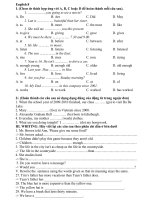Sach bai tap thi diem Anh 8 TEST YOURSELF 3
Bạn đang xem bản rút gọn của tài liệu. Xem và tải ngay bản đầy đủ của tài liệu tại đây (46.2 KB, 4 trang )
TEST YOURSELF 3
1. Circle the word with a different stress pattern from the others.
1. A. classic
B. nature
C. degree
D. debris
2. A. examinee
B. electronic
C. scientific
D. preparation
3. A. classical
B. poisonous
C. logical
D. pollution
4. A. dramatic
B. tornado
C. historic
D. injury
5. A. national
B. physical
C. arrival
D. natural
2. Complete the sentences, using the correct form of the words from the box.
pollute legend poison die attract contaminat explore damage
e
1. Our cars pump out thousands of tones of ______ fumes every year.
2. Air _____ has risen above an acceptable level.
3. The village’s drinking water was _______ with poisonous chemicals.
4. Yuri Gagarin was one of the pioneers of space ________.
5. Building a new road in this area could be environmentally _______.
6. Many animals were burnt to _______ in the forest fire.
7. Buckingham Palace is a major tourist __________.
8. This hill is the _______ home of King Arthur.
3. Choose the correct answer A, B, or C to complete each sentence.
1. A person who _______ the bagpipes is called a piper.
A. plays
B. performs
C. entertains
2. Don’t drink that water. It’s _______.
A. damaged
B. dumped
C. contaminated
3. The team’s success was largely _________ to her efforts.
A. because
B. due
C. since
4. I often drink coffee, but today I _________ tea.
A. am drinking
B. drink
C. drank
5. By the time we got to the cinema, the film ________.
A. started
B. had started
C. starting
6. All our English teachers are ________ speakers.
A. native
B. original
C. foreign
7. If you ________ the president, what would you do to help environment?
A. are
B. had been
C. were
8. Eating too much sugar can _____ to health problems.
A. cause
B. lead
C. make
9. Emergency teams are still removing the ______ from the plane crash.
A. dirt
B. debris
C. dust
10. The heavy rain has caused ______ in many parts of the country
A. storms
B. floods
C. drought
4. Read the paragraph and decide whether the statements are true (T) or false
(F).
There are three main kinds of pollution - air pollution, water pollution,
and noise pollution. Air, which is the most important element of our
environment for our survival; can be polluted in many ways. Smoke in the air
from mills, factories, and industry contains carbon monoxide, carbon dioxide,
and methane, which are all poisonous gases. This leads to health problems like
asthma and lung diseases and the thinning of the ozone layer, which protects us
from harmful UV rays. China, the USA, Russia, India, Mexico, and Japan are the
leaders in air pollution emissions. Water is also polluted by the discharge of
commercial and industrial waste into surface water. Sewage in drinking water
is another cause of water pollution as it contains germs and viruses. The noise of
vehicles, mills, and factories can be really unbearable. This kind of constant
sound also causes headaches, tension, mental stress, and migraines. People living
next to a building site where there is too much noise can become sick, as they
cannot sleep or relax. This is called noise pollution.
T F
1. Air pollution, water pollution, and soil pollution are three main kinds
of pollution.
2. Air plays the most important role in our survival
3. Carbon monoxide, carbon dioxide, and methane are poisonous gases.
4. The ozone layer helps to protect people from harmful UV rays.
5. China, the USA, Russia, India, Mexico, and Japan are the world
leaders in air pollution.
6. The thinning of the ozone layer is caused by smoke in the air from
mills, factories, and industry.
7. Sewage contains germs and viruses
8. Noise pollution is caused by the discharge of commercial and
industrial waste into lakes and rivers.
9. Noise pollution affects everybody’s mental health.
10. All people who live next to a building site become sick as they
cannot sleep or relax.
5. Read the paragraph and choose the correct answer A, B, or C for each of the
gaps.
Australia is a country in the Southern Hemisphere (1) _____ comprises the
mainland of the Australian continent, the island of Tasmania, and many smaller
islands in the Indian and Pacific Oceans. Neighboring countries (2) ______
Indonesia, East Timor, and Papua New Guinea (3) _____ the north, the Solomon
islands, Vanuatu, New Caledonia to the northeast, and New Zealand to the
southeast. Australia (4) _____ six states and two major mainland territories.
The (5) _____ city of Australia is Canberra. With a (6) _____ of over 380,000, it is
Australia’s largest inland city and the eight largest Australian city overall. The
(7)_____ city in Australia and Oceania is Sydney, with a population of over
4,700,000. It is (8) _____ the state capital of New South Wales, and is located
(9)_____ Australia’s large cities are the mainland state capitals; Melbourne,
Brisbane, Perth and Adelaide.
1. A. who
B. where
C. which
2. A include
B. contain
C. has
3. A. on
B. to
C. by
4. A. has
B. takes
C. gets
5. A. capitals
B. urban
C. rural
6. A. pollution
B. population
C. people
7. A. large
B. larger
C. largest
8. A. also
B. too
C. so
9. A. in
B. on
C. to
10. A. Other
B. Others
C. Another
6. Read the text and choose the best answer A, B, or C for each of the following
questions.
THE GREAT HANSHIN EARTHQUAKE
The Great Hanshin earthquake, or the Kobe earthquake as it is more commonly
known overseas, was as earthquake in Japan that measured 7.3 on the Japan
Meteorological Agency magnitude scale. It occurred on January 17th, 1995 at
5:46 a.m. in the southern part of Hyogo Prefecture, and lasted for approximately
20 seconds. The epicentre of earthquake was on the northern and of Awaji island
near Kobe, a cosmopolitan city of over 1.5 million people. A total of 6,434 people,
mainly in the city of Kobe, lost their lives. Additionally, it caused approximately
ten trillion yen in damage. It was the worst earthquake in Japan since the Great
Kanto earthquake in 1923, which claimed 140,000 lives.
1. The word ‘overseas’ in the text is closest in meaning to _____.
A. abroad
B. at sea
C. by sea
2. The word ‘occurred’ in the text is closest in meaning to _____.
A. ended
B. happened
C. started
3. It is stated in the passage that the number of deaths in the city of Kobe
__.
A. was greater than that of the Great Kanto earthquake
B. was not as high as in the Great Kanto earthquake
C. exceeded that of any known earthquake
4. The northern and of Awaji Island was the place where _____.
A. the effects of the earthquake were felt most strongly
B. there was no damage to people and property
C. 1.5 million people lost their lives
5. We understand from the passage that the Kobe earthquake _____.
A. is internationally known as the Great Hanshin earthquake
B. didn’t cause any damage in the neighbourhood of Kobe
C. is not the deadliest earthquake in the history of Japan
7. Put the following statements in the correct order to make a dialogue.
1.
A. It’s worse! It too noisy, and too crowded; sometimes I can’t even hear
myself think!
2.
B. Oh, hi Ruby! What’s this I hear about you moving to the country?
3.
C. It’s not that bad, is it?
4.
D. You’ll see! After a while you’ll be so jealous that you’ll want to move to
the country as well.
5.
E. Come on, Ruby! I’ve known you for almost twelve years, there won’t be
enough action for you out in the country.
6.
F. I doubt it! I’m a city girl.
7.
G. That’s right. I’ve had enough of living in the city,
8.
H. Yeah, right!
9.
I. Hey, Alice! Nice to see you again.
10.
J. I’m sick and tired of city life, and not having enough clean air. Living
in the country will give me the chance to recharge my batteries, and be
closer to nature.
8. Write the new sentences using the word given so that it has a similar meaning
ti the original one. The word given in brackets must not be altered in any way.
1. I’m not you, but I think you should recycle these plastic carrier bags. (if)
__________________________________________________________
2. Emma came first because she worked hard. (result)
_________________________________________________________
3. Eating too much sugar can result in health problems. (lead)
_________________________________________________________
4. All flight had to be cancelled as a result of the pilots’ sudden strike. (so)
_________________________________________________________
5. If I could swim, I would go scuba diving with Terry. (because)
________________________________________________________









